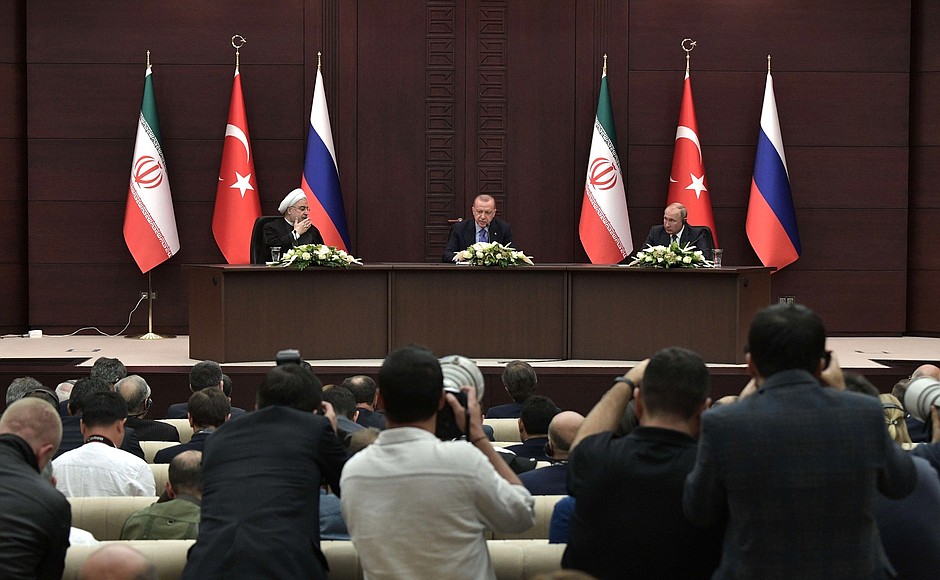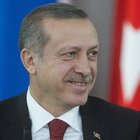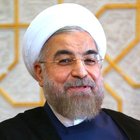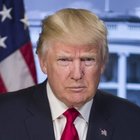
President of Russia Vladimir Putin: Messrs Presidents, colleagues, ladies and gentlemen,
The fifth meeting of the guarantor states of the Astana process on the settlement in Syria was very successful and productive. The joint statement we adopted on its results has sealed our commitment to continued efforts towards a sustainable and viable peace in the Syrian Arab Republic.
We are convinced that this goal can only be achieved through political and diplomatic methods based on UN Security Council Resolution 2254. As the guarantors of the Astana process, our three countries stand for the sovereignty, independence and territorial integrity of Syria.
We believe that one of our priorities is to promote the intra-Syrian political dialogue. With this aim in view we will continue to hold regular expert meetings attended by representatives of the guarantor states, Syria, the UN and regional observers. The next, 14th round of such consultations will be held in Nur-Sultan in October.
See also
In our opinion, we should help Syrians determine the parameters of their form of government themselves. I would like to remind you that this is why the decision to establish a Constitutional Committee was taken last year at the Syrian National Dialogue Congress in Sochi.
Diplomats from our three countries worked painstakingly to help the Syrian Government and opposition choose their candidates for the committee and the basic parameters of its operation. The list of committee members has been fully coordinated with active support from the guarantor states.
The Constitutional Committee must now start working in Geneva as soon as possible. Russia, Turkey and Iran are ready to give every support to this while maintaining the leading role of the Astana process in the settlement in Syria.
We hope that progress in the intra-Syrian political process will serve the interests of stronger security in Syria and the Middle East as a whole and will also help normalise relations between Damascus and Arab countries and restore its membership in the Arab League.
Of course, we also held in-depth talks on the fight against terrorism in Syria. We are especially concerned about the situation in the Idlib de-escalation zone, the control over which has been seized by radical groups affiliated with al-Qaeda.
This is not acceptable to us, and so Mr Erdogan, Mr Rouhani and I have agreed to continue working together towards lifting all tension in Idlib. Russia is resolved to support the Syrian army during local operations aimed at neutralising the terrorist threat anywhere we see it.
Moreover, the ceasefire regime never included terrorists. At the same time, I would like to point out that all of us, I repeat, all of us must do everything we can to prevent anything harmful happening to the civilians.
We are also concerned about the developments in northeast Syria, where ISIS sleeper cells have been revitalised. We believe that security can only be reliably ensured in that part of Syria if the legitimate government resumes control.
Russia, supported by Turkey and Iran, is doing a great deal to provide humanitarian aid to the Syrian people. As I have already said, over 390,000 Syrian refugees and some 1.3 million internally displaced persons have returned back home since July 2018.
Conditions are being created for launching a peaceful reconstruction in Syria. The level of violence has decreased, and the restoration of the social and economic infrastructure is underway.
However, the problems facing the Syrian state are so large that the country needs the support of industrialised countries and international organisations to deal with them, but only if they really want to help the refugees return back home rather than use them and the internally displaced persons to achieve their own political goals, including in the potential future voting on the key topics of Syria’s development.
We also held bilateral meetings with our Turkish and Iranian colleagues. During a meeting with our friend, President of Turkey Mr Erdogan, we discussed current matters regarding Russian-Turkish cooperation, which, as both sides believe, is developing dynamically in many spheres.
As usual, we talked at length about our economic cooperation. Last year, trade between our countries exceeded $25 billion. We are implementing strategic energy projects, including the construction of the Akkuyu Nuclear Power Plant and the TurkStream gas pipeline.
Our military technical ties are growing ever stronger. We are working to implement a contract to supply the S-400 Triumf air defence system. Talks are underway on new promising weapon systems.
Additional
We are deepening our cultural and humanitarian contacts. The cross-years of culture and tourism were a great success in both Russia and Turkey. By the way, we expect to report yet another record achievement in the tourist industry – over 6 million Russian tourists in Turkey.
Our meeting with President of Iran Mr Rouhani focused on the key aspects of Russian-Iranian collaboration in energy, transport and industry. We have agreed to continue large-scale projects, stimulate efforts to expand the practice of using national currencies for trade settlements and exchange opinions on current international topics.
It was logical that we focused on the preservation of the Joint Comprehensive Plan of Action, or JCPOA. We believe that the JCPOA is still viable even though the United States has withdrawn from this plan. The other signatories of this nuclear deal share this view.
I would like to point out that despite any possible problems with the implementation of this plan there is no reasonable alternative to it. Russia will do everything within its power to ensure that it is implemented in full.
We maintain active contacts on the JCPOA with all the signatories, as well as with the United States. It goes without saying that we maintain political dialogue with Iran at all levels.
In conclusion, I would like to express gratitude to President Erdogan, President Rouhani and all our Turkish and Iranian partners for these meaningful and definitely productive talks.
I am confident that the results of our summit meeting will help bring about peace and stability in Syria.
Thank you for your attention.
Question (retranslated): Good afternoon, Messrs Presidents of the three countries.
I have a question for all three of you. You talked about establishing a Constitutional Committee. How will the activity of this committee influence the situation in Syria? In your opinion, how long will this committee for drafting the new constitution work?
With due consideration for the US presence in Syria, I would also like to ask how you assess the US presence on Syrian territory?
Thank you very much.
Vladimir Putin: We believe that the work of the Constitutional Committee will be a decisive factor in the final normalisation of the situation in the Syrian Arab Republic.
We have discussed this many times, and we have always stated that there is no alternative to the political process. We have conducted very substantial work. By the way, both President of Iran Rouhani and President of Turkey Erdogan have made a tremendous contribution to establishing this committee. We worked with the government of Syria and the opposition until recently. Mr Erdogan, who also worked very actively, coordinated the final candidacy at the last moment.
This work was difficult, but we should not forget about another aspect of this matter, namely, the proceedings. We believe it is vitally important that the parties to this process agree on proceedings.
Third, we must do all we can to prevent external forces from hampering the work of the parties to this process, namely, the Syrian people themselves. We need to create favourable conditions for them to work voluntarily and creatively. We want them to strive to achieve a positive result, and we will facilitate this process in every way.
Regarding the presence of the US Armed Forces, it is common knowledge that their presence on Syrian territory is illegal. And we hope that the decision to withdraw US service personnel from Syria, made by President of the United States Donald Trump, will be implemented completely.
Question: I would like to continue with the Constitutional Committee. Is there any idea of when it will be convened? And following the approval of the committee’s composition, in your opinion, is the peaceful political settlement in Syria still under threat?
If you allow me, I have a second question. I must ask you what happened in Saudi Arabia when a Saudi Aramco facility was targeted in a drone attack. Did you discuss this topic during your talks? How will this incident affect the oil market? Does Russia intend to provide Saudi Arabia with any help or support in restoring its infrastructure?
Vladimir Putin: Regarding the Constitutional Committee in Syria, I would refrain from indicating any specific timeframes, although it has to be done as soon as possible. I am referring both to launching the committee, and achieving a positive outcome by having the conflicting parties come to an agreement in the interests of their people. We will do everything it takes to facilitate this process.
Are there any threats? I have already mentioned them. These include the possible provocations by extremists who I believe are trying to derail this process. A final settlement is not what they are interested in. They benefit from other things. They benefit from war. This is what our troika is all about. We are here to neutralise these threats.
Finally, external influences are also a threat. Let me reiterate that Syrians must be able to address by themselves the serious problems their country has been facing over the past years.
We did not discuss the airstrikes against Saudi Arabia’s refineries. However, you know our position, I mean Russia’s position. First, it is true that an extreme humanitarian disaster is unfolding in Yemen. Disaster is the right word to describe what is going on in that country. We are ready to help and call on everyone who can do this to follow our lead. This is my first point.
Second, we believe that the best way to overcome this crisis is to facilitate agreements between all the parties involved in the conflict. Here in Turkey, in a predominately Muslim country, a verse from the Quran comes to mind: “And remember the favour of Allah upon you – when you were enemies and He brought your hearts together and you became, by His favour, brothers.” I believe that this message is highly relevant: you became, by His favour, brothers. It is emphasised that things that set people apart and bring about conflict must be relegated to the background, while the spiritual kinship among people must prevail.
As for assisting Saudi Arabia, it is also written in the Quran that violence of any kind is illegitimate except when protecting one’s people. In order to protect them and the country, we are ready to provide the necessary assistance to Saudi Arabia. All the political leaders of Saudi Arabia have to do is take a wise decision, as Iran did by buying the S-300 missile system, and as President Erdogan did when he bought Russia’s latest S-400 Triumph anti-aircraft system. They would offer reliable protection for any Saudi infrastructure facilities.
President of Iran Hassan Rouhani: So do they need to buy the S-300 or the S-400?
Vladimir Putin: It is up to them to decide.
Question (retranslated): This question is for all three leaders and has to do with the efforts to establish a joint command. What do Russia and Iran think about enforcing a security zone? There is also the issue of amnesty. In your opinion, could it contribute to the political settlement?
Vladimir Putin: I have nothing new to say on this point. I can only reiterate was I have said in public statements earlier. We believe that all countries in the region, including Turkey, have the right to self-defence and to protecting their national interests and their borders. This does nothing to invalidate the second point that President Erdogan never opposed. On the contrary, he fully supported it. We all stand for the territorial integrity of the Syrian Arab Republic, proceeding from the premise that when questions related to ensuring security and fighting terrorism are resolved, Syria’s territorial integrity will be fully restored. This also refers to the withdrawal of all foreign troops from the territory of the Syrian Arab Republic.


